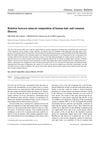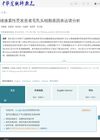Search
for
Sort by
Research
30-60 / 1000+ resultsresearch The Expression of Melatonin Receptor in Human Hypertrophic Scar
Melatonin might help treat thick scars.
research New Synthesis of Finasteride
research Muscle Weakness of the Lower Limbs After Epidural Anesthesia in a Pregnant Woman With Undiscovered Systemic Lupus Erythematosus
Undiagnosed lupus can cause severe complications after epidural anesthesia, leading to muscle weakness and potentially death.
research Observation of Therapeutic Effects of Quzhi Fangtuo Pill in the Treatment of Early Androgenetic Alopecia

research Androgen Profile in Chinese Women with Polycystic Ovary Syndrome in Their Reproductive Years
Chinese women with PCOS have higher androgen levels, which change with age and weight.
research Clinical Observed Human Dermal Papilla Cells Conditioned Medium Treated Androgenetic Alopecia
research A Possible Solution for Hair Loss by Inhibiting Corticotropin-Releasing Factor Receptor from Traditional Chinese Medicine
Caribine from traditional Chinese medicine may help treat hair loss.

research In-Silico Studies in Herbal Drugs: A Review
Computational methods can speed up and improve the development and safety of herbal drugs.
research Female Pattern Hair Loss in Clinic
research Correction: Traditional Chinese Medicine Shi-Bi-Man Regulates Lactic Acid Metabolism and Drives Hair Follicle Stem Cell Activation to Promote Hair Regeneration

research Clinical Experience of Professor Ma Shuanquan in Treating Androgenetic Alopecia
Professor Ma Shuanquan treats hair loss by using Chinese medicine to improve liver, spleen, and kidney health.
research Histopathological Evaluation of Urethroplasty with Buccal Mucosa Graft: An Experimental Study in Rabbits
Buccal mucosa grafts work well for urethroplasty in rabbits.
research Induction of Hair Follicle Regeneration in Mice Ear by Microencapsulated Human Hair Dermal Papilla Cells
Microencapsulated human hair cells can regenerate hair follicles in mice ears.

research Relation Between Mineral Composition of Human Hair and Common Illnesses
Hair mineral content can help diagnose certain common illnesses.
research The Clinical Features and Long-Term Follow-Up of Neonatal Lupus Erythematosus in 12 Children
Neonatal lupus symptoms usually resolve, but some children may develop other autoimmune diseases later.
research Effect of Chinese Medicinal Herbs on Human Scalp Hair Growth In Vitro
Low doses of certain Chinese herbs can promote hair growth, while high doses may inhibit it.
research Clinical Observation of ChuZhiShengFaPian Combined with Licorzine Granules for the Treatment of Early Androgenetic Alopecia in Males

research Anti-Androgenetic Alopecia Effect of Policosanol from Chinese Wax by Regulating Abnormal Hormone Levels to Suppress Premature Hair Follicle Entry into the Regression Phase
Policosanol helps treat hair loss by balancing hormones and supporting hair growth.
research The Curative Effect of Metformin in Combination with Dyne-35 on the Treatment of Polycystic Ovary Syndrome and on the Ovulation Rate and Pregnancy Rate
Metformin combined with dyne-35 increases ovulation and pregnancy rates in PCOS patients.

research Genome-Wide Expression Profile Analysis of 3D Cultured Dermal Papilla Cells from Patients with Androgenic Alopecia
Hair loss in androgenic alopecia patients is linked to changes in certain genes that control cell growth and death.
research Correlations of the Onset of Androgenic Alopecia with Family History and Serum Dihydrotestosterone Levels in 614 Female Patients

research A Case of Cicatricial Female Pattern Hair Loss
A 36-year-old woman with worsening hair loss over 10 years was treated with various medications, and after six months, her hair loss did not worsen significantly.

research Preparation of Finasteride via Oxidative Elimination of 2-Iododihydrofinasteride Using Peroxydisulfates as Oxidizing Agents
Using K2S2O8 as an oxidizing agent in a specific condition, we can make Finasteride with 96.3% yield and 99.6% purity. This method is also good for other compounds and is environmentally friendly.

research Natural Bioactive Compounds as Potential Sources for Alleviation and Treatment of Androgenetic Alopecia: A Research Advance
Natural compounds from Chinese herbs may safely promote hair growth and treat common hair loss.

research Induction of Hair Follicle Regeneration in Rat Ear by Microencapsulated Human Hair Dermal Papilla Cells
Human hair cells can be used to grow new hair on rat ears, suggesting a possible treatment for hair loss.

research Angelica Sinensis and Chinese Arborvitae: A Review on Its Phytochemical and Pharmacological Importance
Angelica Sinensis and Chinese Arborvitae have various medicinal benefits, including anti-inflammatory and anti-cancer effects.
research A Randomized Controlled Trial Comparing Total Glucosides of Paeony Capsule and Compound Glycyrrhizin Tablet for Alopecia Areata
Both treatments for alopecia areata are equally effective and safe.
research Research Advance in Androgenetic Alopecia in 2020
In 2020, there were improvements in understanding, diagnosing, and treating androgenetic alopecia.
research The Experimental Study of C57BL/6 Mouse Skin Hair Follicle Development
Hair follicles in C57BL/6 mice develop rapidly from late embryonic stages to shortly after birth, with key growth and regeneration phases identified.